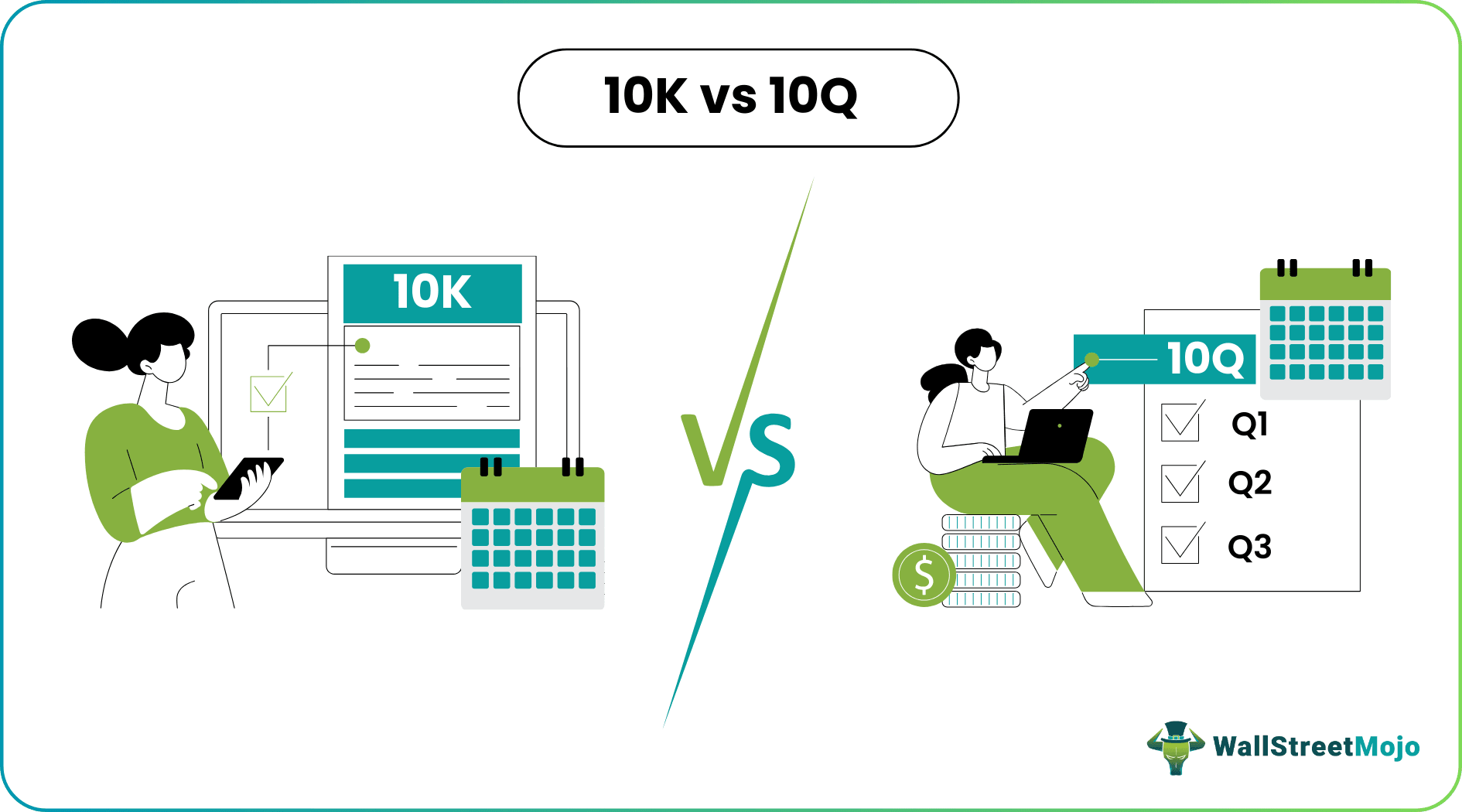Table Of Contents
Difference Between 10K vs 10Q
SEC forms are essential documents that investors need to read to obtain accurate information about the company. SEC filings deliver pure details on a company, unblemished by brokerage analysis. One can find out everything they want to know about a company through these reports, cash in hand, a package of the CEO, etc. 10-K vs. 10-Q is the most common SEC filing.

It is worth it when analyzing a company to calculate what one thinks. But, first, one must get a good hands-on company balance sheet, typically locating a copy of the company's annual report, 10-K, and 10-Q forms. Each document serves a different purpose and has a different role in understanding the business.
What is 10Q?
It is the company's quarterly report. Generally, the 10-Q is less detailed than the annual report. Companies must fill the same within 45 days of the end of their quarter. The financial statements that are included in the quarterly report are generally unaudited. It contains fewer details than 10-K due to the abbreviated nature of the measurement period, among other things, under certain circumstances.
Form 10-Q can give a deep understanding of the long-run business changes even before it reflects earning figures once we can get details of things like huge net share buyback in a year that is not done yet, it is included in the annualized earnings per share, and due to this, diluted earning per share is calculated. One can see the status and condition of different turnovers like stock turnover, inventory turnover, etc. It helps to learn about legal risks, which could lead to lawsuits or legal action against a company.
Many traders use Saxo Bank International to research and invest in stocks across different markets. Its features like SAXO Stocks offer access to a wide range of global equities for investors.
What is 10K?
10-K has been filed annually that once a year to SEC. 10-K has all the in-depth details about the company. It contains all the elements one wants to know about a company, which will help him analyze its future growth and decide to invest wisely. 10-K has all details, from the CEO's salary to the company's financial condition.
Some investors feel that form 10-K is impossible to understand. They face many challenges while reading them. Still, if a reader has good knowledge of finance, it is easy for him to understand and extract meaningful information about a company and its structure. Many businesses have a long 10-K report of more than several hundred pages. In 10-K, some companies do not show financial statements and disclosures. And instead of this, there is a line written "incorporate herein by reference," which means that all the financial details or disclosure information is already been released; this release could be an annual report. If anyone wants to read it, he can read it. A copy of the annual report is available on the company and SEC websites.
10K vs 10Q Infographics
Here, we provide you with the top 5 differences between 10-K and 10-Q.

10K vs 10Q - Key Difference
The key differences between 10K and 10Q are as follows: -
- 10-K has all details like business, property, staff, financial data, executive compensation, etc. Whereas 10-Q has a submission of matters put to the vote of security holders. It describes the result of shareholder voting at the last annual shareholder's meeting. Typically, topics are voted upon, including the re-election of board members and the ratification of the appointment of the company's auditors for the upcoming fiscal year.
- A company's time to file a 10-Q is shorter than a 10-K.
- 10K is an annual report and is more comprehensive than a 10-Q.
- The Securities and Exchange Commission filing of 10-K is done annually. Whereas 10-Q filing is done quarterly, i.e., three times a year, the filling is not done as 10-K is filed in the last quarter.
- 10-K has details in extreme depth. Whereas 10-Q has less detail.
- 10K contains audited financial statements. In contrast, 10Q filings are not, although the company's external auditors, typically perform some reviews.
- For the preparation of the 10-K, a 10-Q is needed, whereas a 10-Q and a 10-K are not required. So, 10-K is dependent on 10-Q.
- 10-K is substantially greater in scope than a 10-Q.
Form 10-K is an annual report and is more comprehensive than a 10-Q, which is a quarterly report that consists primarily of the quarterly financial statements and the management discussion and analysis disclosure (an analysis of period over period financial results. So, it will compare, e.g., Sept 30'2021 to Sept 30'2022 and tell why there were fluctuations between periods). Suppose one evaluates an investment in a company. In that case, they always want to look at the 10-K because it includes more information on its business plan, risks, management team, and financial condition. Use the 10-Q to update that information. The financial summary is too limited in scope. It is still essential to read the annual report, 10-K, and 10-Q because there are things one cannot include in a financial summary. SEC filing delivers the correct information about a company that helps investors make the right choice. Hence, the investor should read the 10-K and 10-Q to get the exact position of the company.
10K vs 10Q Head-to-Head Difference
Let us now look at the head-to-head differences between 10-K and 10-Q.
| 10K | 10Q |
|---|---|
| The company's SEC filing of 10-K is done yearly, i.e., once a year. | The company's SEC filing of 10-Q is done quarterly, i.e., three times per year. |
| 10K is extremely deep. Every detail is covered about the company. | 10-Q has fewer details. |
| 10K is generally an audited report. | 10-Q is an unaudited report. |
| SEC filing must be done within 90 days after the company's fiscal year. | SEC filing must be done 45 days after the end of the company’s fiscal quarter. |
| For the preparation of the 10-K, a 10-Q is required. | 10-Q does not need 10-K. |
Deadlines for Filing Periodic Report Of 10K vs 10Q
The deadlines for companies to file 10-K and 10-Q are as follows: -
| Category | 10K | 10Q |
|---|---|---|
| Large Accelerated Filter | 60 Days | 40 Days |
| ($700 million or more) | ||
| Accelerated Filter | 75 Days | 40 Days |
| ($75 MM or more and less than $700 million) | ||
| Non-accelerated Filter | 90 Days | 45 Days |
| (less than $75 million) |
Many traders use Saxo Bank International to research and invest in stocks across different markets. Its features like SAXO Stocks offer access to a wide range of global equities for investors.
Disclosure: This article contains affiliate links. If you sign up through these links, we may earn a small commission at no extra cost to you.

